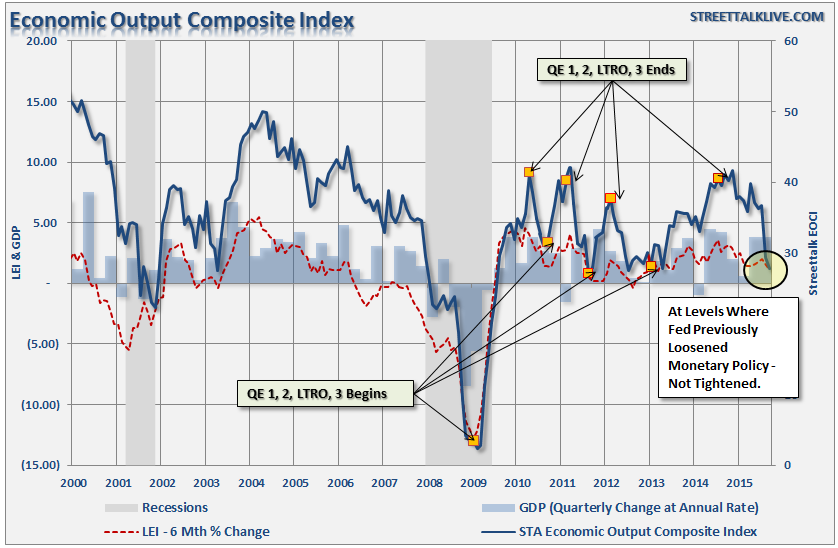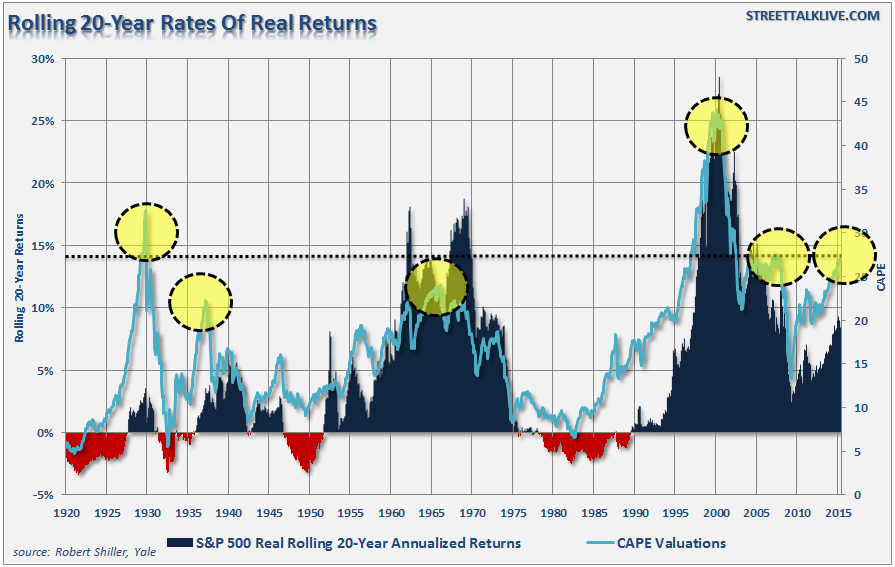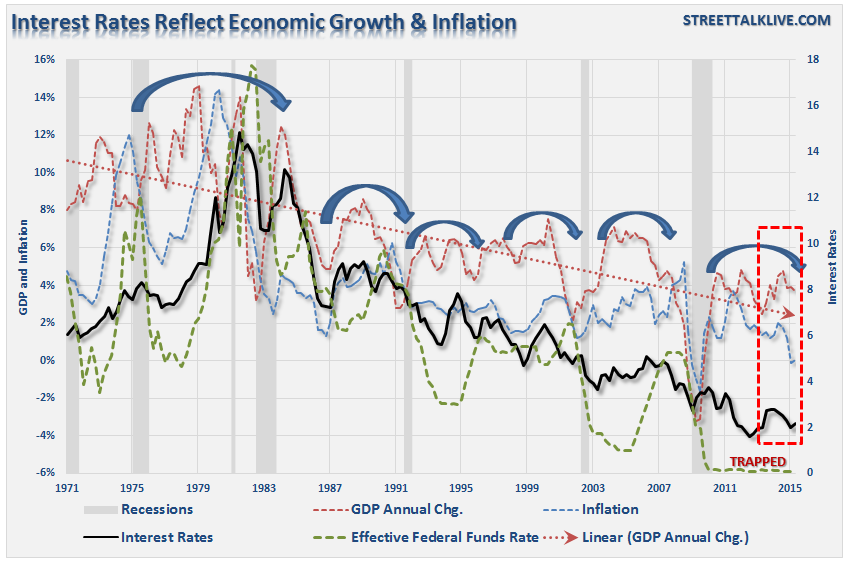This past weekend, Akin Oyedele penned an article via Business Insider entitled "I went to a seminar with one of the world's largest banks and almost everything said there was really bearish."
"At HSBC's global-investment seminar in New York last week, some of the top strategists from Europe's largest bank laid out their outlook for global markets and economies.
Many strategists are not expecting the current recovery from the financial crisis to be as impressive as what has come before, while some investors aren't expecting double-digit returns in the near term.
Additionally, strategists are losing faith that the Federal Reserve will actually raise interest rates anytime soon."
Akin seems genuinely shocked the data suggests economic growth may not be on the cusp of surging and stocks might fail to deliver double-digit returns.
However, since I was long ago excised by the media for allowing the "data to speak," let me clarify, for both you and Akin, why HSBC (N:HSBC) is likely correct in their analysis.
Economic Hopes To Be Disappointed
Despite ongoing hopes of a resurgence of economic growth over the past six years, each year has only led to disappointment. As I discussed previously:
"If you are expecting an economic recovery, and a continuation of the bull market, then the economic data must begin to improve markedly in the months ahead. The problem has been that each bounce in the economic data has failed within the context of a declining trend. This is not a good thing and is why we continue to witness an erosion in the growth rates of corporate earnings and profitability. Eventually, that erosion combined, with excessive valuations, will weigh on the financial markets which is potentially much of what we are witnessing now.
The economy continues to ebb and flow between weak growth and no growth. This puts the Federal Reserve at risk of a policy mistake that could trip the economy into an outright recession. While there have certainly been positive bumps in the data, as pent-up demand is released back into the economy, the inability to sustain growth is most concerning."
This "ebb and flow" within a weakening trend can be most clearly seen in the Economic Output Composite Index. As shown, recent hopes of a resurgence in economic growth have all but faded as the data has plunged to levels normally more associated with outright recessions.
Not So Rewarding
Unfortunately, substantially weaker economic growth, both domestically and globally, will continue to weigh on future stock market returns particularly when coupled with already high valuation levels. While Mr. Oyedele seemed disappointed that some investors weren't expecting continued "double-digit" returns in the near term, near zero returns over the next decade (after including taxes, inflation, and fees) will likely be outright depressing.
Ultimately, stocks are not magical pieces of paper that provide double-digit returns over the long run. In fact, we've just had a 15-year period of lousy (less than 5% annualized) returns, and it all has to do with valuation.
While WallStreet, and the financial media, continue to push individuals into the casino to increase revenues, what is ultimately forgotten is that stocks are ownership units of businesses. While that seems banal, future equity returns are simply a function of the value you pay today for a share of future profits.
The chart below shows that rolling 20-year returns from current valuation levels have been substantially less optimistic. After fees, taxes and inflation, it is substantially worse.
The Fed Can't Raise Rates
The recent rally in the dollar has been primarily a function the anticipation by the currency markets of the Fed raising interest rates. Of course, such a rate hike would be taken as a sign of a stronger economic backdrop, which would be supportive of a stronger dollar.
Well, that is what was hoped. The reality, as I have been discussing for over two years, is the Fed is "caught in a liquidity trap" and can not raise rates for the foreseeable future. To wit:
"The problem for the Federal Reserve is that getting caught in a liquidity trap was not an unforeseen outcome of monetary policy, but rather an inevitable conclusion. As shown in the chart below of GDP, inflation, and interest rates, each time the Fed has intervened with monetary policies it has lead to lower rates of economic growth and lower rates of inflaton and interest rates. As stated, the current low levels of inflation, interest rates, and economic growth are the result of more than 30-years of misguided monetary policies that have led to a continued misallocation of capital.
For several years, there have been repetitive screams that inflation was imminent due to deficits, a fiat currency and expanding debt levels. Yet, the opposite has been true. The lack of inflation has been a construct of the underlying structural dynamics of the economy. Home ownership rates have plunged, technological advances and productivity increases have fostered wage suppression, and high levels of uncounted unemployed (54% of the 16-54 aged labor force) drag on economic strength."
The Federal Reserve is quickly becoming trapped by its own "data-dependent" analysis. Despite ongoing commentary of improving labor markets and economic growth, their own indicators are suggesting something very different.
As I have stated previously, while the Federal Reserve may hike interest rates simply to "save face," there is indeed little real support for them doing so. Tightening monetary policy further will simply accelerate the time frame to the onset of the next recession. Of course, the Fed knows this which is why they recently floated the idea of "negative interest rates" out into the markets. In other words, they already likely realize they are screwed.
Staying Bullish
With the current economic cycle already long by historical standards, economic data continuing to remain weak and profit margins on the decline, there is an increasing possibility that "risk" may well outweigh "reward" in the near term.
While we are entering the "best 6-months" of the year, any rally from the recently oversold conditions is likely a good opportunity to "de-risk" portfolios going into two of the weakest years of the decennial cycle.
In simpler terms, while WallStreet continues to flood the media with "bullish spin" to keep individuals invested in order to collect "fees," the actual data suggests that "odds are heavily stacked in favor of the house."
The inherent problem of "eternal bullishness" is the "wilfull blindness" to the underlying data in an effort to chase short-term returns. This leads to the unfortunate problem of being "all-in" on every hand which has a devastating consequence when a mean reverting event occurs.
John Hussman once penned an excellent piece on the full-market cycle:
"Regardless of very short-term market direction, it is urgent for investors to understand where the equity markets are positioned in the context of the full market cycle. While the most extreme overvalued, overbought, overbullish, rising-yield syndrome we define has generally appeared only at the most wicked market peaks in history, and investors have ignored those conditions over the past year. We can't be certain when the deferred consequences will emerge. But a century of market history provides strong reason to believe that any intervening gains will be wiped out in spades.
It's instructive that the 2000-2002 decline wiped out the entire total return of the S&P 500 – in excess of Treasury bills – all the way back to May 1996, while the 2007-2009 decline wiped out the entire excess return of the S&P 500 all the way back to June 1995. Overconfidence and overvaluation always extract a terrible payback."
In the end, it does not matter IF you are "bullish" or "bearish." The reality is that both "bulls" and "bears" are owned by the "broken clock" syndrome during the full-market cycle. However, what is grossly important in achieving long-term investment success is not necessarily being "right" during the first half of the cycle, but by not being "wrong" during the second half.



